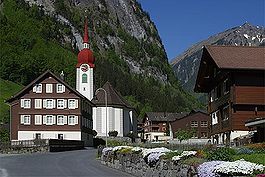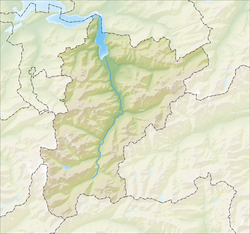Isenthal
Isenthal | |
|---|---|
 | |
| Coordinates: 46°54′N 8°33′E / 46.900°N 8.550°E | |
| Country | Switzerland |
| Canton | Uri |
| District | n.a. |
| Area | |
• Total | 60.97 km2 (23.54 sq mi) |
| Elevation | 771 m (2,530 ft) |
| Population (31 December 2018)[2] | |
• Total | 483 |
| • Density | 7.9/km2 (21/sq mi) |
| Time zone | UTC+01:00 (Central European Time) |
| • Summer (DST) | UTC+02:00 (Central European Summer Time) |
| Postal code(s) | 6461 |
| SFOS number | 1211 |
| ISO 3166 code | CH-UR |
| Surrounded by | Attinghausen, Bauen, Beckenried (NW), Emmetten (NW), Engelberg (OW), Flüelen, Seedorf, Seelisberg, Wolfenschiessen (NW) |
| Website | www SFSO statistics |
Isenthal is a municipality in the canton of Uri in Switzerland.
History
[edit]Isenthal is first mentioned in 1280 as Yseltal.[3]
Geography
[edit]

Isenthal has an area, (as of the 2004/09 survey) of 60.97 km2 (23.54 sq mi).[4] Of this area, about 28.0% is used for agricultural purposes, while 27.1% is forested. Of the rest of the land, 0.8% is settled (buildings or roads) and 44.0% is unproductive land. Over the past two decades (1979/85-2004/09) the amount of land that is settled has increased by 17 ha (42 acres) and the agricultural land has decreased by 32 ha (79 acres).[5]
In the 1993 land survey[update], 21.4% of the total land area was heavily forested, while 1.4% is covered in small trees and shrubbery. Of the agricultural land, 5.7% is used for orchards or vine crops and 22.2% is used for alpine pastures. Of the settled areas, 0.3% is covered with buildings, and 0.2% is transportation infrastructure. Of the unproductive areas, 0.9% is unproductive flowing water (rivers), 35.6% is too rocky for vegetation, and 8.8% is other unproductive land.[6]
The municipality is located at the intersection of the Chlital and the Grosstal. It consists of the village of Isenthal and widely scattered small settlements.
Demographics
[edit]Isenthal has a population (as of December 2020[update]) of 476.[7] As of 2013[update], 1.0% of the population are resident foreign nationals. Over the last 3 years (2010-2013) the population has changed at a rate of -0.95%. The birth rate in the municipality, in 2013, was 3.8 while the death rate was 5.7 per thousand residents.[5]
As of 2013[update], children and teenagers (0–19 years old) make up 25.6% of the population, while adults (20–64 years old) are 58.4% and seniors (over 64 years old) make up 16.0%.[5]
In 2013 there were 168 private households in Isenthal. Of the 172 inhabited buildings in the municipality, in 2000, about 47.7% were single family homes and 16.9% were multiple family buildings. Additionally, about 44.8% of the buildings were built before 1919, while 14.0% were built between 1991 and 2000.[8] In 2012 the rate of construction of new housing units per 1000 residents was 1.89. The vacancy rate for the municipality, in 2014[update], was 1.61%.[5]
Most of the population (as of 2000[update]) speaks German (99.3%), with Polish being second most common (0.4%) and French being third (0.2%).[9] As of 2007[update] the gender distribution of the population was 52.4% male and 47.6% female.[10]
The historical population is given in the following table:[3][11]
| Year | Population |
|---|---|
| 1698 | c. 150 |
| 1743 | 176 |
| 1799 | 360 |
| 1850 | 502 |
| 1900 | 595 |
| 1950 | 550 |
| 1970 | 570 |
| 1980 | 535 |
| 1990 | 505 |
| 2000 | 539 |
| 2005 | 538 |
| 2007 | 536 |
Economy
[edit]As of 2012[update], there were a total of 215 people employed in the municipality. Of these, a total of 129 people worked in 47 businesses in the primary economic sector. The secondary sector employed 26 workers in 13 separate businesses. Finally, the tertiary sector provided 60 jobs in 18 businesses. In 2013 a total of 1.9% of the population received social assistance.[5]
Politics
[edit]In the 2015 federal election the most popular party was the CVP with 53.5% of the vote. The next three most popular parties were the SVP (28.0%), the GPS (17.0%) and other candidates received 1.5%. In the federal election, a total of 204 votes were cast, and the voter turnout was 51.5%. The 2015 election saw a large change in the voting when compared to 2011, due to only certain parties running candidates in each election. In 2011 only the SP and the FDP.The Liberals had candidates on the ballot, while in 2015 only the CVP, SVP and GPS ran.[12]
In the 2007 federal election only the FDP appeared on the ballot and they received 92.3% of the vote.[9]
Education
[edit]In Isenthal about 60.5% of the population (between age 25–64) have completed either non-mandatory upper secondary education or additional higher education (either university or a Fachhochschule).[9]
Weather
[edit]Isenthal has an average of 150.2 days of rain per year and on average receives 1,562 mm (61.5 in) of precipitation. The wettest month is July during which time Isenthal receives an average of 193 mm (7.6 in) of precipitation. During this month there is precipitation for an average of 14.4 days. The month with the most days of precipitation is June, with an average of 15.5, but with only 182 mm (7.2 in) of precipitation. The driest month of the year is February with an average of 95 mm (3.7 in) of precipitation over 14.4 days.[13]
References
[edit]- ^ a b "Arealstatistik Standard - Gemeinden nach 4 Hauptbereichen". Federal Statistical Office. Retrieved 13 January 2019.
- ^ "Ständige Wohnbevölkerung nach Staatsangehörigkeitskategorie Geschlecht und Gemeinde; Provisorische Jahresergebnisse; 2018". Federal Statistical Office. 9 April 2019. Retrieved 11 April 2019.
- ^ a b Isenthal in German, French and Italian in the online Historical Dictionary of Switzerland.
- ^ Arealstatistik Standard - Gemeindedaten nach 4 Hauptbereichen
- ^ a b c d e Swiss Federal Statistical Office - Regional portraits Archived 2016-01-05 at the Wayback Machine accessed 2 May 2016
- ^ Canton Uri - Ground use statistics Archived 2011-07-07 at the Wayback Machine (in German) accessed 8 September 2009
- ^ "Ständige und nichtständige Wohnbevölkerung nach institutionellen Gliederungen, Geburtsort und Staatsangehörigkeit". bfs.admin.ch (in German). Swiss Federal Statistical Office - STAT-TAB. 31 December 2020. Retrieved 21 September 2021.
- ^ Swiss Federal Statistical Office STAT-TAB - Thema 09 - Bau- und Wohnungswesen (in German) accessed 5 May 2016
- ^ a b c Swiss Federal Statistical Office Archived 2016-01-05 at the Wayback Machine accessed 9 September 2009
- ^ Uri Population statistics Archived 2011-07-07 at the Wayback Machine (in German) accessed 8 September 2009
- ^ Uri in Numbers 2009/10 edition Archived 2011-07-07 at the Wayback Machine (in German) accessed 8 September 2009
- ^ Swiss Federal Statistical Office - Nationalratswahlen 2015: Stärke der Parteien und Wahlbeteiligung nach Gemeinden Archived 2016-08-02 at the Wayback Machine (in German) accessed 18 July 2016
- ^ "Temperature and Precipitation Average Values-Table, 1961-1990" (in German, French, and Italian). Federal Office of Meteorology and Climatology - MeteoSwiss. Archived from the original on 27 June 2009. Retrieved 8 May 2009., the weather station elevation is 778 meters above sea level.
External links
[edit]- http://www.isenthal.ch
- Isenthal in German, French and Italian in the online Historical Dictionary of Switzerland.





